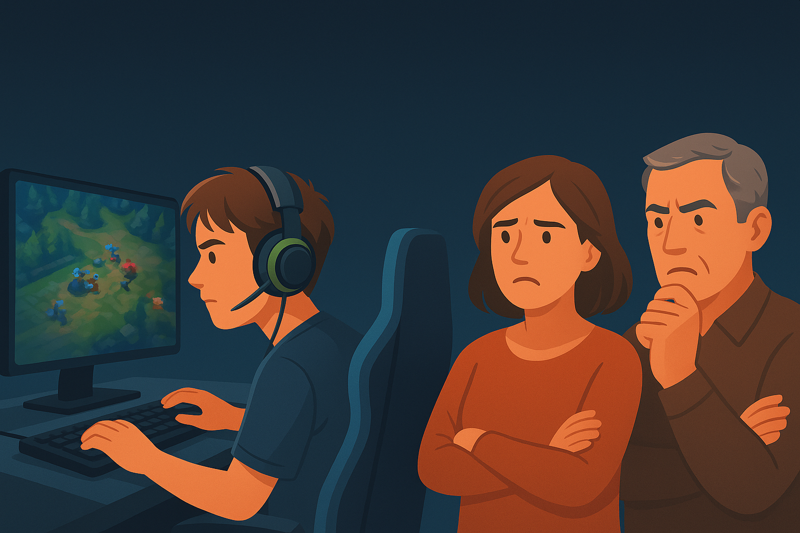
A teenager is glued to the monitor, the screen flashing with virtual battles, and the lively shouts of teammates coming through the headphones. For many parents, this sight is cause for concern: is their child wasting time on meaningless games?
But according to experts at Unlimluck, esports has long gone beyond being a child’s hobby. It is a huge industry with millions of viewers and prizes that rival traditional sports. So how do parents feel about their son’s or daughter’s dream of making money from gaming? It seems that their opinions are divided, just like players before a match.
Initial concerns: gaming instead of studying
When it comes to esports, parents often frown. Long hours at the computer seem to them to be a waste of time, a distraction from lessons or real life. Remembering their own childhood, playing in the yard, tag, and ball games, they wonder: how can this be compared to endless mouse clicks in a dark room? “And this is now called work?” is a question that many fathers and mothers have in their minds. It is noteworthy that they are concerned not only about the time but also about the precariousness of such a career: esports seems like a game of roulette where only a few win.
In addition, health is another sore subject. Hour-long marathons in front of the screen, slouching, tired eyes: all this seems more like a problem than a profession. Mothers often sigh: “My son plays Dota 2 until late at night. I like his enthusiasm, but what will happen to his health in ten years?” Such thoughts are understandable: for the older generation, esports is like an unexplored island where fog still reigns.
A change of perspective: from scepticism to support
But not all parents are sceptical. Some, having delved into the subject, see esports as more than just games. It’s like chess, only faster: it requires strategy, discipline and the ability to work in a team. For teenagers who find physical education at school a real pain, esports becomes a way to show what they are capable of. And parents are noticing this.
By the way, high-profile successes also play their part. News of prize pools, such as $40 million at The International, makes even the grumblers think twice. Today, parents are increasingly enrolling their children in gaming clubs, almost like boxing or dancing. “My son plays in school Valorant tournaments,” fathers often say. “I’ve gotten hooked myself and follow his matches like I used to follow hockey.” Stories like these show that once esports becomes more understandable, it gains support. By the way, you can read more about parent-child relationships in our blog.
Incidentally, the prize funds for modern esports tournaments like The International are truly astonishing. Today, these are no longer simple fan competitions but professional leagues. The winners not only take home a multi-million pound prize but also become global stars.
Large companies sponsor these competitions. Top esports players like JJonak have the chance to land a lucrative contract. That is why many people today view such sports careers as a kind of business project. The hours, days and weeks spent training at the computer can bring millions of dollars, prosperity and comfort in the future.
By the way, professionals recommend looking at esports in comparison with other disciplines. For example, in motorsport, there is always a risk of injury or even death. Playing on a computer does not involve such threats, so parents can rest assured about their children’s health.
What is frightening and what is encouraging?
Support is growing, but doubts remain. Parents are concerned about the pressure young players face: criticism from fans, stress from defeat, and a busy training schedule. “It’s like big-time sport,” mothers reflect. “But at least there are medals, and here what?” In addition, many do not know that esports is not only about players but also coaches, analysts, and streamers.
Still, there are bright sides. Esports teaches children skills that will be useful everywhere: teamwork, quick thinking, and quick reactions. And, to be honest, it’s important for parents to see the sparkle in their child’s eyes. When they talk excitedly about the new update in League of Legends, it’s hard not to wonder: maybe this is their path?
Esports, like an arena under bright spotlights, continues to grow, and parents are slowly getting used to its rhythm. For some, it’s still a risk; for others, it’s a chance to reveal their child’s talent. The main thing is that arguments about games are turning into conversations. And who knows, maybe the mum who grumbles about “shooters” today will be applauding her champion on the world stage tomorrow.
